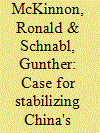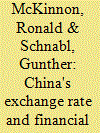|
|
|
Sort Order |
|
|
|
Items / Page
|
|
|
|
|
|
|
| Srl | Item |
| 1 |
ID:
086472


|
|
|
|
|
| Publication |
2009.
|
| Summary/Abstract |
China's financial conundrum arises from two sources. First, its large saving (trade) surplus results in a currency mismatch because it is an immature creditor that cannot lend in its own currency. Instead, foreign currency claims (largely US dollars) build up within domestic financial institutions. Second, economists, both American and Chinese, mistakenly attribute the surpluses to an undervalued RMB. To placate the USA, the result was a gradual and predictable appreciation of the RMB against the dollar of 6 percent or more per year from July 2005 to July 2008. Together with the fall in US interest rates since mid-2007, this oneway bet in the foreign exchanges markets not only attracted hot money inflows but inhibited private capital outflows from financing China's huge trade surplus. Therefore, the People's Bank of China had to intervene heavily to prevent the RMB from ratcheting upwards, and so became the country's sole international financial intermediary as official exchange reserves exploded. Because of the currency mismatch, floating the RMB is neither feasible nor desirable, and a higher RMB would not reduce China's trade surplus. Instead, monetary control and normal private-sector finance for the trade surplus require a return to a credibly fixed nominal RMB/USD rate similar to that which existed between 1995 and 2004. However, for any newly reset RMB/USD rate to be credible as a monetary anchor, foreign "China bashing" to get the RMB up must end. Then the stage would be set for fiscal expansion to both stimulate the economy and reduce its trade surplus.
|
|
|
|
|
|
|
|
|
|
|
|
|
|
|
|
| 2 |
ID:
131397


|
|
|
|
|
| Publication |
2014.
|
| Summary/Abstract |
Instability in the world dollar standard, as most recently manifested in the US Federal Reserve's near-zero interest rate policy, has caused consternation in emerging markets with naturally higher interest rates. China has been provoked into speeding RMB "internationalization"; that is, opening up domestic financial markets to reduce its dependence on the US dollar for invoicing trade and making international payments. However, despite rapid percentage growth in offshore financial markets in RMB, the Chinese authorities are essentially trapped into maintaining exchange controls (reinforced by financial repression in domestic interest rates) to avoid an avalanche of foreign capital inflows that would threaten inflation and asset price bubbles by driving nominal interest rates on RMB assets down further. Because a floating (appreciating) exchange rate could attract even more hot money inflows, the People's Bank of China should focus on keeping the yuan/dollar rate stable so as to encourage naturally high wage increases to help balance China's international competitiveness. However, further internationalization of the RMB, as with the proposed Shanghai pilot free trade zone, is best deferred until world interest rates rise to more normal levels.
|
|
|
|
|
|
|
|
|
|
|
|
|
|
|
|
| 3 |
ID:
065485


|
|
|
|
|
| Publication |
Sep-Oct 2005.
|
|
|
|
|
|
|
|
|
|
|
|
|
|
|
|
| 4 |
ID:
121739


|
|
|
|
|
| Publication |
2013.
|
| Summary/Abstract |
Under near-zero US interest rates, the international dollar standard malfunctions. Emerging markets with naturally higher interest rates are swamped with hot money inflows. Emerging market central banks intervene to prevent their currencies from rising precipitately. They lose monetary control and domestic prices begin inflating. Primary commodity prices rise worldwide unless interrupted by an international banking crisis. This cyclical inflation on the dollar's periphery only registers in the US core consumer price index with a long lag. The zero interest rate policy also fails to stimulate the US economy as domestic financial intermediation by banks and money market mutual funds is repressed. Because China is forced to keep its interest rates below market-clearing levels, it also suffers from financial repression, although in a form differing from that in the USA.
|
|
|
|
|
|
|
|
|
|
|
|
|
|
|
|
| 5 |
ID:
107995


|
|
|
|
|
| Publication |
2011.
|
| Summary/Abstract |
The international dollar standard is malfunctioning. Near-zero US short-term interest rates launch massive hot money outflows into emerging markets (EM) in Asia and Latin America. Each EM central bank buys dollars to prevent its currency from appreciating but loses monetary control. Despite some appreciation, average inflation in EMs is now much higher than in the old industrial economies and world commodity prices are bid up sharply. This inflation on the dollar's periphery only registers in the US CPI with a long lag. However, the more immediate effect of the Fed's zero interest rate is to upset the process of bank intermediation within the American economy. Bank credit continues to decline while employment languishes. Therefore, constructive international monetary reform calls for the Fed to abandon its zero-interest rate policy, which is best done in cooperation with the European Central Bank, the Bank of Japan, and the Bank of England also abandoning their ultra low interest rates.
|
|
|
|
|
|
|
|
|
|
|
|
|
|
|
|
|
|
|
|
|